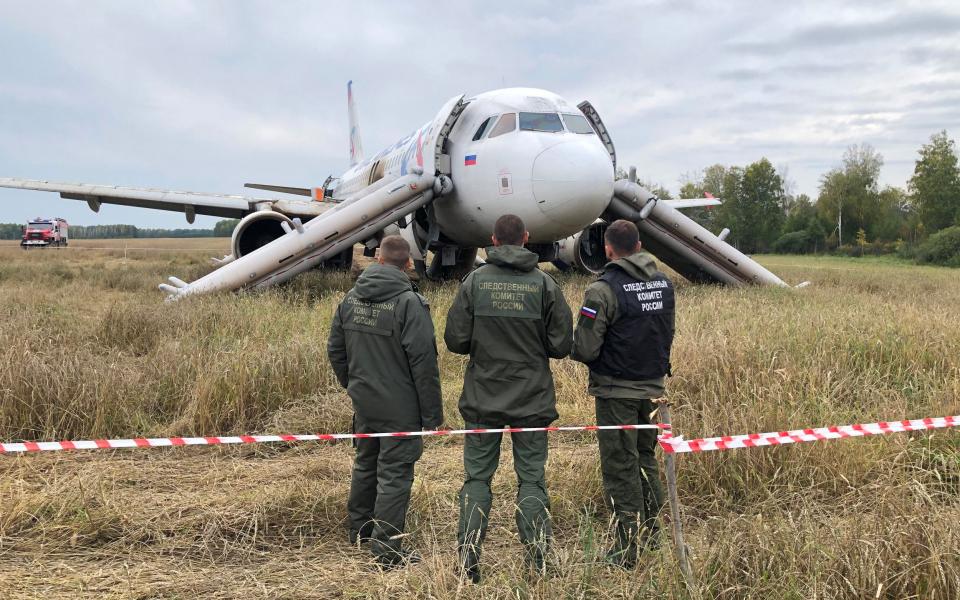Last September, a Ural Airlines Airbus A320 plane carrying 165 people was forced to crash-land in a wheat field on a modest farmland next to a forest in Novosibirsk, Siberia.
When the hydraulic systems of the plane failed while flying from Omsk to Sochi and the plane started to run out of fuel, the pilot had to take drastic measures.
Six months later, the plane is still there, grounded because Ural Airlines couldn’t fly it.
The farmer whose land is now home to the plane was reportedly paid one million rubles (£8,700) by Ural Airlines for the privilege.


This is just the latest in a series of airline crashes in Russia since sanctions have blocked the repair and maintenance of Western planes.
In December, a Boeing 737 belonging to S7 Airlines had to make an emergency landing in Siberia after flames started coming out of its engine.
On the same day, an Airbus plane belonging to Rossiya Airlines made an emergency landing in Mineralnye Vody after it started falling from the sky.
That same month, state airline Aeroflot was struggling with landing gear and wing flap failures as the cabin of one of its Boeing 777s filled with smoke.
Security incidents on Russian planes more than doubled last year.
According to the Jet Aircraft Accident Data Evaluation Center (JACDEC), there were 37 cases in 2022. Last year there were 81 cases, and more than half of them were linked to technical factors.
Jan-Arwed Richter, founder and CEO of JACDEC, says the actual total could be significantly higher.
“These figures only reflect publicly disclosed cases,” he says. “There is still a dark number of unreported incidents.
“Many aircraft are unusable as they have been taken apart to keep the rest of the fleet in flying condition.”
The Russian blogosphere has recently been set on fire due to security issues, with many blaming the influence of Western sanctions.
In a post on pro-government Telegram channel Nezygar, he called the restrictions a “crime against civilians”, calling for multimillion-dollar lawsuits against manufacturers who fail to provide parts.
The European Union Aviation Safety Agency (EASA) has already issued a stern warning about the safety of Russian jets.
“EASA has serious concerns about the safety situation of aviation in Russia, including critical safety-related issues such as how aircraft are maintained or how pilots and maintenance personnel are trained,” the agency’s Janet Northcote said.
“We have seen reports of substandard practices becoming widespread in Russia, such as the use of parts of questionable origin.”


Sanctions imposed following Vladimir Putin’s invasion of Ukraine mean Russian operators cannot access spare parts or technical updates for Western-built aircraft.
“This is basically almost all types of aircraft used in Russian business aviation,” says aviation analyst Andrei Menshenin.
Despite this, Russian planes are still flying.
“The data shows that the commercial fleet is about the same size as the same time last year,” says Rob Morris, global head of consulting at aviation analytics firm Cirium.
But cracks are showing.
According to Cirium’s data, the number of aircraft flying daily on Russian domestic flights during the summer peak decreased by about a tenth compared to 2022.
When sanctions were first imposed, Russian airlines quickly found ways to get around them.
Menshenin, who has not imposed any sanctions against Russia, says one such solution is to get help from overseas allies such as Turkey.
He says that if the engine of a Russian plane needs repairs, the airline can sell it to an airline in Turkey. This airline will then use Western parts to repair it before returning it to Russia.
“Turkey can perform the necessary maintenance according to flight safety procedures and then sell this engine back,” he says. “I’m talking to people in Russia who are doing this.”
He says Russian companies also import parts from Central Asian countries such as Kazakhstan.
“American or European companies are not prohibited from exporting anything to Kazakhstan,” says Menshenin. “But there are companies owned by Russian companies in Kazakhstan and they import them across the border.”
But there’s a problem here, he adds: “A Russian airline now has to pay two, maybe three times more for the same amount it did before the sanctions.”
Commercial airlines around the world operate on low profit margins ranging from 1 percent to 2 percent, and in Russia these margins are rapidly eroding.
“If your engine repairs become three times more expensive, then you’re really struggling to make ends meet,” says Menshenin.
Along with financial pressures, sanctions mean Russian airlines are no longer allowed to operate in the EU and their travel in European airspace is restricted.
This means that some sources of income disappear while others become uneconomic.
A typical flight from Moscow to Havana, Cuba, would be 5,200 nautical miles (5,984 miles).
However, Menshinin says that planes must now follow a longer route, and that this journey will be at least 800 nautical miles and the flight time will increase by more than two hours.
Russian charter airline Azur Air has since abandoned this route altogether.
The impact of sanctions is greater for small carriers. But even Russia’s largest private airline, S7, had to ground its planes.
Analysts fear that the number of accidents will increase even if the number of flights in the country decreases.
Consultant Oliver Wyman expects Russia’s total number of operational aircraft to decrease by more than half by 2026.
“The best-case scenario is that Russian airlines continue to fly most of the fleet, even if smaller airlines no longer exist,” says Menshinin. “The worst-case scenario is that Russian airlines will have to completely abandon the newest types of aircraft.”
The Russian Federal Air Transport Agency, S7, Aeroflot and Ural Airlines were contacted for comment.